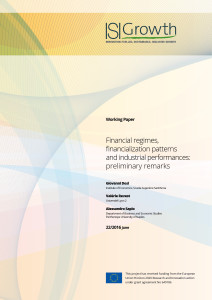The evolutionary taxonomy of financial systems, outlined by Dosi (1990), argued that market-based systems would be comparatively more engaged in the exploration of new technological paradigms, as an outcome of market selective pressure, whereas the more institutionalized finance allocation in credit-based systems would give them an advantage in cumulative learning. This article offers a preliminary assessment of those conjectures in light of the institutional change associated with the financialization process and the “maximizing shareholders value” principle. The available evidence suggests that financialization has de-linked the performance of firms on the financial markets from the determinants of firm-level growth and innovation. Selection among companies increasingly occurs on financial markets, along criteria of short-term returns. As such, financialization has contributed to compress and somewhat degrade the specific properties of the finance-innovation nexus of both financial system archetypes, deteriorating both static and Schumpeterian efficiency.
Financial Regimes, Financialization Patterns and Industrial Performances: Preliminary Remarks
Giovanni Dosi
Institute of Economics, Scuola Superiore Sant’ Anna
Valérie Revest
Université Lyon 2
Alessandro Sapio
Department of Business and Economic Studies, Parthenope University of Naples

